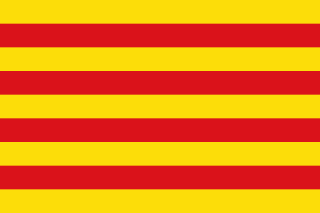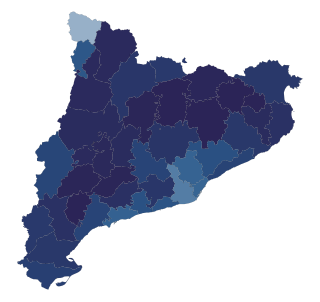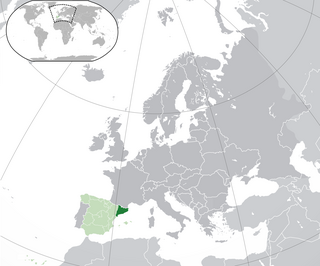| |||||
| Decades: | |||||
|---|---|---|---|---|---|
| See also: | |||||
Events from 2010 in Catalonia .
| |||||
| Decades: | |||||
|---|---|---|---|---|---|
| See also: | |||||
Events from 2010 in Catalonia .

Catalonia is an autonomous community on the northeastern corner of Spain, designated as a nationality by its Statute of Autonomy. Catalonia consists of four provinces: Barcelona, Girona, Lleida, and Tarragona. The capital and largest city is Barcelona, the second-most populated municipality in Spain and the core of the fifth most populous urban area in the European Union. It comprises most of the territory of the former Principality of Catalonia. It is bordered by France (Occitanie) and Andorra to the north, the Mediterranean Sea to the east, and the Spanish autonomous communities of Aragon to the west and Valencia to the south. The official languages are Catalan, Spanish, and the Aranese dialect of Occitan.

In Spain, an autonomous community is a first-level political and administrative division, created in accordance with the Spanish constitution of 1978, with the aim of guaranteeing limited autonomy of the nationalities and regions that make up Spain.
The Generalitat de Catalunya, or Government of Catalonia, is the institutional system by which Catalonia politically organizes its self-government. It is formed by the Parliament of Catalonia, the Presidency of the Generalitat de Catalunya, and the Executive Council of Catalonia

Catalan nationalism is the ideology asserting that the Catalans are a nation.

Convergence and Union was a Catalan nationalist electoral alliance in Catalonia, Spain. It was a federation of two constituent parties, the larger Democratic Convergence of Catalonia (CDC) and its smaller counterpart, the Democratic Union of Catalonia (UDC). It was dissolved on 17 June 2015.
The Executive Council of Catalonia or the Government of Catalonia is the executive branch of the Generalitat of Catalonia. It is responsible for the political action, regulation, and administration of the government of the autonomous region.

The Catalan independence movement is a social and political movement with roots in Catalan nationalism, which seeks the independence of Catalonia from Spain and, by extension, the independence of North Catalonia from France and that of other Catalan Countries.
The Catalans are a Romance ethnic group native to Catalonia of Mediterranean and Pyrenean descent, having its roots in the Pyrenees mountains. The current official category of "Catalans" is that of the citizens of Catalonia, an autonomous community in Spain and the inhabitants of the Roussillon historical region in southern France, today the Pyrénées Orientales department, also called Northern Catalonia and Pays Catalan in French.

Spain is a diverse country integrated by contrasting entities with varying economic and social structures, languages, and historical, political and cultural traditions. According to the current Spanish constitution, the Spanish nation is the common and indivisible homeland of all Spaniards, composed of nationalities and regions which the constitution recognizes and guarantees the right of self-government.

Both the perceived nationhood of Spain, and the perceived distinctions between different parts of its territory are said to derive from historical, geographical, linguistic, economic, political, ethnic and social factors.
The 2009–2011 Catalan independence referendums, a series of non-binding and unofficial referendums, "popular votes", took place in municipalities around Catalonia. In them voters indicated whether they supported Catalan independence from Spain. The first such referendum took place in Arenys de Munt on 13 September 2009: there followed votes in Sant Jaume de Frontanyà on 12 December and in 166 other municipalities on 13 December. Another vote ensued in April 2011 in Barcelona.

The 2010 Catalan regional election was held on Sunday, 28 November 2010, to elect the 9th Parliament of the autonomous community of Catalonia. All 135 seats in the Parliament were up for election. This was the first election held in Catalonia after the Constitutional Court of Spain struck down parts of the regional 2006 Statute of Autonomy that granted new powers of self-rule to the region. The ruling came after four years of deliberation concerning a constitutional appeal filed by the conservative People's Party (PP) under Mariano Rajoy and was met with anger and street protests throughout the region.

The 2010 Catalan autonomy protest was a demonstration in central Barcelona on 10 July 2010 against limitations of the autonomy of Catalonia, and particularly against a recent decision of the Spanish Constitutional Court to annul or reinterpret several articles of the 2006 Statute of Autonomy of Catalonia. The number of people taking part in the demonstration was estimated at between 1.1 million and 1.5 million, while Madrid-based newspaper El País estimated the number of demonstrators at 425,000. The mobilisation was described as "unprecedented" by the mayor of Barcelona. The Barcelona daily newspaper El Periódico de Catalunya described it as "without a doubt one of the biggest protest marches that has ever occurred in Catalonia, possibly the biggest". It is thought that the 2012 Catalan independence demonstration involved more people, but this protest brought the dispute to light in the world.
The Statute of Autonomy of Catalonia of 2006 provides Catalonia's basic institutional regulations under the Spanish Constitution of 1978. It defines the rights and obligations of the citizens of Catalonia, the political institutions of the Catalan community, their competences and relations with the rest of Spain, and the financing of the Government of Catalonia.

Oriol Junqueras i Vies is a Spanish politician, historian and academic from Catalonia. A former mayor of the municipality of Sant Vicenç dels Horts in north-eastern Spain, Junqueras served as Vice President of Catalonia from January 2016 to October 2017 when he was removed from office following the Catalan declaration of independence and entered prison, convicted to 13 years for his role in organizing the 2017 Catalan independence referendum. He is president of the Republican Left of Catalonia (ERC). Born in 1969 in Barcelona, Junqueras grew up in the municipality of Sant Vicenç dels Horts. After graduating from the Autonomous University of Barcelona, he taught history at the university.

A non-binding Catalan self-determination referendum, also known as the Citizen Participation Process on the Political Future of Catalonia, was held on Sunday, 9 November 2014, to gauge support on the political future of Catalonia. While also referred to as "Catalan independence referendum", the vote was rebranded as a "participation process" by the Government of Catalonia, after a "non-referendum popular consultation" on the same topic and for the same date had been suspended by the Constitutional Court of Spain.

Carles Puigdemont i Casamajó is a Catalan pro-independence politician and journalist serving as a Member of the European Parliament (MEP) for Spain since 2019. A former Mayor of Girona, Puigdemont served as the 130th President of Catalonia from 2016 to 2017 when he was removed from office by the Spanish Government following the unilateral Catalan declaration of independence. He is co-founder of the National Call for the Republic (CNxR) and leader of the Junts per Catalunya (JuntsxCat) electoral alliance.

The 2017–2018 Spanish constitutional crisis, also known as the Catalan crisis, was a political conflict between the Government of Spain and the Generalitat de Catalunya under former President Carles Puigdemont—the government of the autonomous community of Catalonia until 28 October 2017—over the issue of Catalan independence. It started after the law intending to allow the 2017 Catalan independence referendum was denounced by the Spanish government under Prime Minister Mariano Rajoy and subsequently suspended by the Constitutional Court until it ruled on the issue. Some international media outlets have described the events as "one of the worst political crises in modern Spanish history".

The Catalan declaration of independence was a resolution that was passed by the Parliament of Catalonia on 27 October 2017, which declared the independence of Catalonia from Spain and the founding of an independent Catalan Republic. The declaration did not receive recognition from the international community.

The Torra Government is the incumbent regional government of Catalonia led by President Quim Torra. It was formed in May 2018 after the regional election.